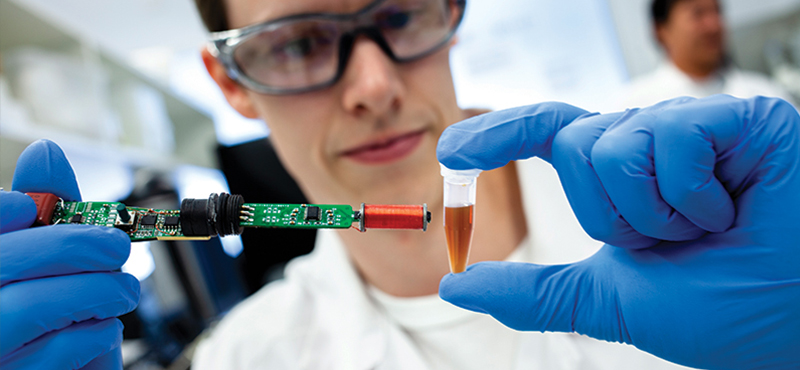The problem
COVID-19 is the biggest health crisis the world has experienced in the past 100 years, causing more than three million deaths worldwide, crippling economies, and deeply impacting businesses and jobs.
As the COVID-19 death toll mounts and the world hangs its hopes on effective vaccines, what else can we do to save lives in this pandemic?
The solution
In partnership with medical device company, Ferronova, researchers from UniSA’s Future Industries Institute (FII), Dr Aidan Cousins and Professor Benjamin Thierry, have developed a biodiagnostic system to refine cancer detection. The system consists of a magnetic probe and injectable magnetic nanoscale tracers, able to detect the spread of cancer less invasively, more quickly, and more accurately than existing methods.
“We are aiming to assist surgeons assess whether a cancer has spread or not, to be more precise with treatment to minimise side effects,” Prof Thierry says. “Cancer survival is getting better because we have more efficient treatment, and this means people are living much longer post-treatment. But if morbidity associated with the treatment is serious, as it often is currently, then that really impacts on the quality of life of the patient.”
Relying on magnetic rather than radioactive tracers, this new technology takes form as an ultra-sensitive magnetometer probe designed to be about the size of a ballpoint pen – a small device with the potential for extraordinary impact.
It delivers a more accurate and affordable system for the staging of deep or complex cancers, such as head and neck, gastrointestinal and oesophageal cancers, where lymph nodes are closely packed or clustered.
The technology also offers logistical benefits for hospitals. The switch to magnetic tracers means there is no need for the specialised rooms, equipment and training currently required for radioactive agents. Smaller and regional hospitals and medical services will also be able to employ the technology locally, reducing stress and expense on patients who would otherwise have to travel to major cities for treatment.
Ferronova was spun out of UniSA and Victoria University of Wellington in 2016, and since its inception, has continued to strengthen its operations. In 2020, it was awarded a $826,000 grant from the Australian Government’s BioMedTech Horizons Program to further its nanoparticle development project and raised more than $3.5 million to conduct clinical trials in collaboration with the MD Anderson Cancer Centre.

Ferronova CEO, Stewart Bartlett, says since Ferronova formed, the collaboration between the company and UniSA has developed substantially.
“Translating university IP into human trials is a significant undertaking, and the Ferronova nanoparticle technology is one of the first new magnetic nanoparticle technologies to be translated to the clinic in over 20 years,” Mr Bartlett says.
“The collaboration has been positive for both UniSA and Ferronova. Ferronova has benefited by being co-located in world class facilities at the UniSA Mawson Lakes campus, leasing a world class clean room for GMP manufacturing, accessing infrastructure and facilities required for testing and analysing nanoparticles, and collaborating with world class researchers on a daily basis. UniSA have benefited by broadening their collaborative research to include the University of Sydney, being actively involved in the translation of research into the clinic, and collaborating with experienced biotech executives with extensive commercial experience, thereby gaining exposure to the process for commercialising medical research.”
Partners involved

Related services
Contact the Enterprise Hub
Get in touch with us to find out how we can support your business needs.
Make an enquiry online or call us to discuss your idea


